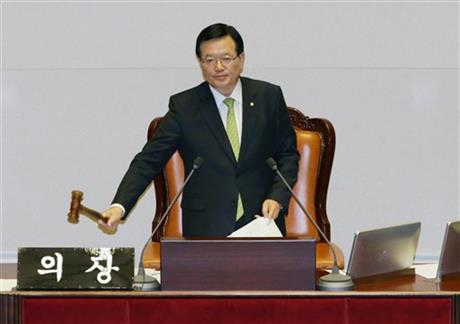- California Assembly OKs highest minimum wage in nation
- S. Korea unveils first graphic cigarette warnings
- US joins with South Korea, Japan in bid to deter North Korea
- LPGA golfer Chun In-gee finally back in action
- S. Korea won’t be top seed in final World Cup qualification round
- US men’s soccer misses 2nd straight Olympics
- US back on track in qualifying with 4-0 win over Guatemala
- High-intensity workout injuries spawn cottage industry
- CDC expands range of Zika mosquitoes into parts of Northeast
- Who knew? ‘The Walking Dead’ is helping families connect
Opposition party gives up filibuster, counter-terrorism bill passes

South Korean National Assembly Speaker Chung Ui-hwa bangs the gavel as he announces passing an anti-terror legislation during the plenary session at the National Assembly in Seoul, South Korea, Wednesday, March 2, 2016. Outnumbered South Korean opposition lawmakers on Wednesday ended more than a week of nonstop speeches in the National Assembly aimed at delaying a vote on the country’s first anti-terror legislation. (Kim Hyun-tai/Yonhap via AP)
SEOUL, South Korea (AP) — Lawmakers approved South Korea’s first anti-terror legislation Wednesday after outnumbered opposition members ended more than a week of nonstop speeches in the National Assembly aimed at delaying the vote.
Nearly 160 parliament members voted for the bill, with one voting against it. Opposition lawmakers apparently boycotted.
The 38 liberal lawmakers who filibustered said the bill threatens personal freedoms and privacy. They took turns speaking for more than 193 hours in the filibuster beginning Feb. 23, reportedly making it one of the longest of its kind in world politics.
They stopped their marathon speeches out of concern that a continuation might cause a public backlash ahead of April parliamentary elections.
The last speaker, Lee Jong Kul, spoke for 12 hours and 31 minutes before leaving the podium in the evening, breaking the record for the country’s longest parliamentary speech that had been set Saturday by a fellow opposition legislator who spoke for 11 hours and 31 minutes.
The legislation will become law when it is endorsed by the Cabinet Council, considered a formality.
President Park Geun-hye’s conservative government had called for the bill’s quick passage, citing threats from North Korea following its recent nuclear test and rocket launch.
Filibusters to block legislative action made a comeback in South Korean politics in 2012 under a law designed to improve parliamentary politics. Before that, partisan strife was so acute that rival lawmakers sometimes engaged in violent shoving matches.
The anti-terror legislation enables the country’s spy agency to wiretap phone conversations and collect the personal information of suspects. Critics worry the National Intelligence Service might misuse the law to monitor opponents and other civilians. Currently, the agency can only wiretap those suspected of engaging in pro-North Korean activities.
The legislation also calls for establishment of an anti-terror center tasked with formulating security measures for major state events and issuing terror advisories.
Several similar anti-terror bills have been introduced in the assembly in recent years but none became law, due in large part to wrangling over what investigative rights the NIS should be given. November’s Paris attacks that killed 130 people and North Korea’s recent nuclear test and rocket launch are believed to have helped the bill’s approval.
The NIS has a history of involvement in domestic politics.
Two of its directors received suspended prison terms in 2006 for overseeing the monitoring of phone conversations of high-profile figures. Another director was sentenced to three years in prison last year for ordering an illicit online campaign during the 2012 presidential race, though the country’s top court later ordered a new trial for him. In the 1960s to 1980s, the agency detained, tortured and allegedly killed those challenging military-backed rule.
















Pingback: High stakes for presidential hopefuls in South Korean election | East Asia Forum